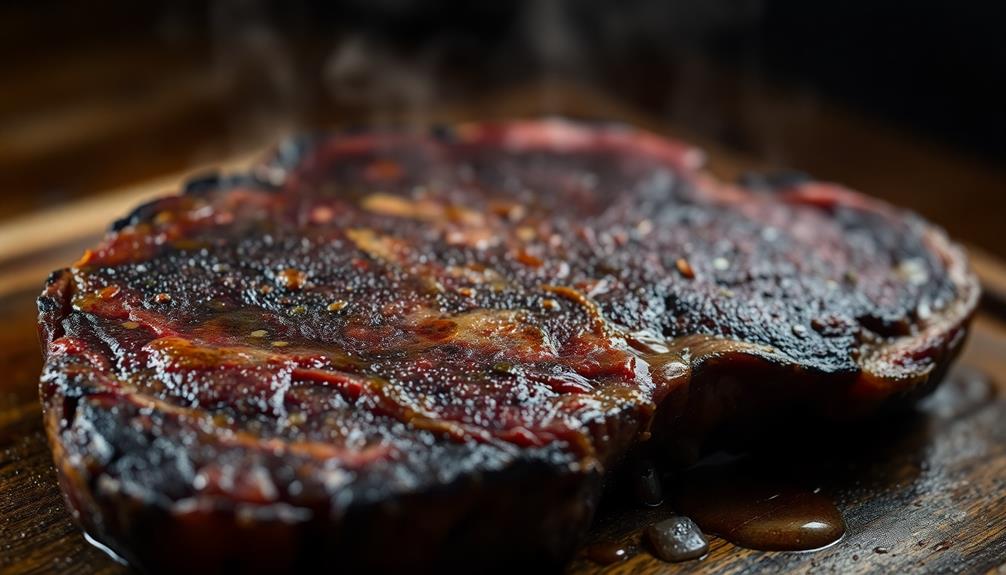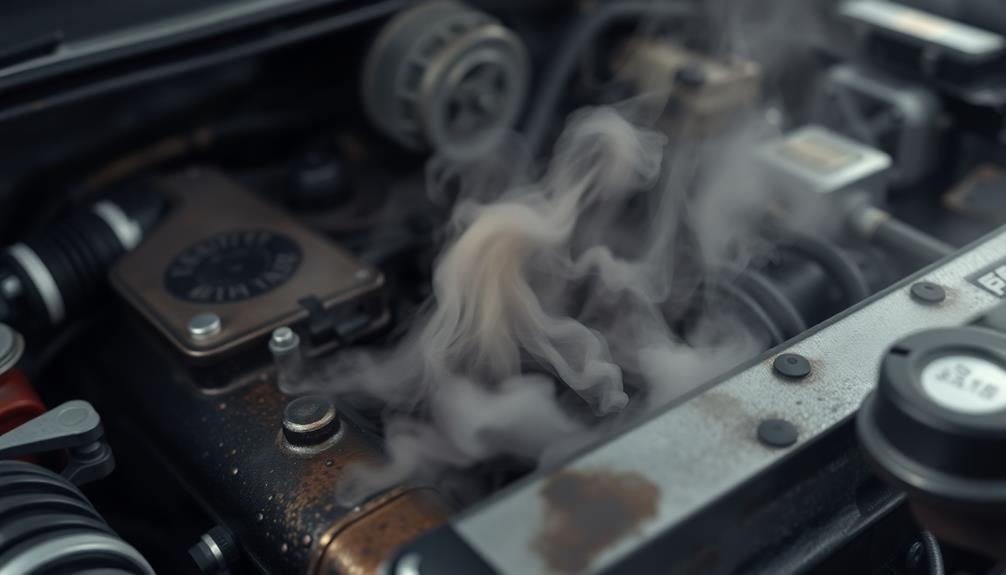Propane smells sharp and pungent, like rotten eggs! This distinctive smell comes from a substance called mercaptan, added to help keep you safe. Propane itself is colorless and odorless, but the added scent alerts you to any leaks. You've probably noticed this smell while grilling or camping. If you ever catch a whiff, it's important to take immediate action; turn off flames, get to fresh air, and check for leaks. Staying aware of this smell is essential for safety. And trust me, there's even more fascinating info about propane that'll help you understand it better!
Key Takeaways
- Propane itself is colorless and odorless, but mercaptan is added to give it a distinct smell.
- The smell of propane is often described as resembling rotten eggs or sulfur due to the mercaptan.
- This pungent odor is specifically designed to alert users to potential gas leaks for safety.
- Immediate action is necessary if the smell is detected, including ventilating the area and turning off flames.
- Regular maintenance of propane appliances is essential to prevent leaks and ensure safe operation.
Introduction

When you think about propane, you might be surprised to learn that it doesn't have a smell on its own. That's right! It's actually a colorless and odorless gas, which means it could be sneaky if it didn't have a little help.
To keep you safe, propane companies add a substance called mercaptan, which gives it that distinct smell you might associate with rotten eggs. This way, if there's ever a leak, you can smell it right away and take action.
Propane is widely used for heating homes, cooking, and powering outdoor grills. It's a popular choice because it's efficient and can be stored easily in tanks. You might even find it in your backyard, providing energy for your barbecue parties!
Understanding the smell of propane is crucial for safety. You'll want to know what to do if you ever catch a whiff of that unusual odor.
Description of the Smell

The smell of propane, enhanced by the added mercaptan, resembles that of rotten eggs or sulfur. When you first catch a whiff, it might surprise you. This distinct odor is designed to alert you to any leaks, keeping you safe. You won't mistake it for anything pleasant; it's sharp and pungent, definitely not something you'd want wafting around while cooking.
Imagine standing near a grill or a propane heater, and suddenly, that unmistakable scent hits you. It's a bit like someone opened a carton of spoiled eggs right next to you! But don't worry; this smell is a safety feature. Propane itself is odorless, so the mercaptan is added deliberately to help you notice any potential danger quickly.
If you ever smell propane, you should take it seriously. Quickly check for leaks or go outside to get fresh air. It's important to act fast!
Source and Composition

Propane primarily comes from natural gas processing and crude oil refining. When natural gas is extracted from underground, it often contains propane along with other gases. Refining crude oil also releases propane as a useful byproduct. So, you could say that propane is a superstar in the energy world, often found hanging out with its buddies, but it's the one that gets the spotlight!
Now, let's talk about its composition. Propane is a hydrocarbon, which means it's made up of hydrogen and carbon atoms. Specifically, each propane molecule has three carbon atoms and eight hydrogen atoms, giving it the chemical formula C3H8.
This simple structure makes it very efficient for burning, which is why you'll find it in so many heating and cooking applications.
To make propane even safer, suppliers add a special odorant, typically ethyl mercaptan, to give it that distinctive smell. You might think it smells a bit like rotten eggs, but this helps you detect leaks easily.
Typical Scenarios or Environments

Searching for an energy source that's versatile and efficient? You might find propane fits the bill perfectly! This fuel is commonly used in various environments, making it a popular choice for many households and businesses alike.
You'll often encounter propane in outdoor settings, like barbecues and campsites. Imagine grilling your favorite burgers with friends; the delicious aroma mixes with the unique smell of propane, thanks to that added scent.
Propane's also a favorite for heating homes, especially in rural areas where natural gas isn't available.
In addition, propane is prevalent in farms, where it powers equipment and water heaters. It even helps in drying crops!
Don't forget about its role in recreational vehicles. Many campers use propane for cooking and heating while out in nature.
Emotional or Cultural Associations

Many people associate the distinct smell of propane with warm gatherings and cherished memories. You might recall family barbecues where laughter filled the air, and the delicious scent of grilled burgers wafted around. The unmistakable odor of propane often signals that it's time to gather with friends and enjoy good food.
Cultural events, like camping trips or outdoor festivals, also bring about this association. You can almost picture the crackling campfire and the glow of the flames, all fueled by propane. For many, that smell evokes feelings of adventure, relaxation, and connection with nature.
In some cultures, propane's aroma is tied to rituals and celebrations, like tailgating at sports events or preparing traditional foods. It's a reminder of shared experiences and the joy of cooking together.
Plus, let's not forget that friendly competition over who makes the best grilled chicken! You may find yourself reminiscing about those moments when the smell of propane fills the air.
Health or Safety Considerations

When using propane, it's crucial to prioritize safety to prevent accidents and health risks.
Propane is a colorless gas, but it has a strong smell added to it, similar to rotten eggs, which helps you detect leaks. If you ever smell this odor, it's essential to act quickly. First, turn off any flames, like candles or stoves, and don't use electrical switches, as sparks can ignite the gas.
Next, get outside immediately and call your propane supplier or emergency services. Don't return to the area until professionals say it's safe.
Always ensure your propane appliances are well-maintained and vented properly to avoid carbon monoxide buildup, which can be dangerous. Installing a carbon monoxide detector in your home is a smart move, giving you peace of mind.
Also, keep propane tanks upright and in a well-ventilated area, away from heat sources. Regularly check hoses and connections for wear and tear, as even small leaks can lead to big problems.
Final Thoughts

Using propane can be a rewarding experience, whether for cooking, heating, or outdoor activities. You'll find that propane isn't only efficient but also versatile, making it a favorite for many households.
However, it's essential to remember that safety comes first. Always be aware of the distinct smell that propane has, thanks to the added odorant, which helps you detect leaks. If you ever catch a whiff, it's crucial to act quickly by turning off the source and ventilating the area.
When using propane, maintaining your equipment is key. Regular checks on hoses, connections, and tanks can help prevent issues and keep everything running smoothly. You wouldn't want a surprise while grilling burgers, right?
As you explore different ways to utilize propane, whether it's for a cozy fire pit night or a delicious outdoor feast, enjoy the benefits it brings.
Just keep the safety tips in mind, and you'll have a great time. Propane can truly enhance your experiences, so dive in and make the most of it. With a little care and attention, you'll be a propane pro in no time!
Frequently Asked Questions
Can the Smell of Propane Be Mistaken for Other Odors?
Yes, you can mistake the smell of propane for other odors, like rotten eggs or a skunk's spray, especially if you're unfamiliar with it. Always trust your instincts and investigate any suspicious smells immediately.
How Can I Detect a Propane Leak?
To detect a propane leak, regularly check your appliances and connections for any signs of damage or wear. If you smell gas, evacuate immediately, then call your local emergency services or propane supplier for assistance.
Is the Smell of Propane Harmful to Pets?
Yes, the smell of propane isn't harmful to pets in small amounts. However, if you notice your pet acting strangely or showing signs of distress, it's best to get them to fresh air immediately.
What Should I Do if I Smell Propane?
If you smell propane, act quickly. Evacuate the area, avoid electrical devices, and don't light any flames. Once outside, call your gas provider or emergency services to report the leak and ensure everyone's safety.
Can Propane Odor Fade Over Time?
Yes, propane odor can fade over time, especially if the leak is minor or the area is ventilated. However, if you smell it, always take it seriously and check for any potential leaks immediately.










